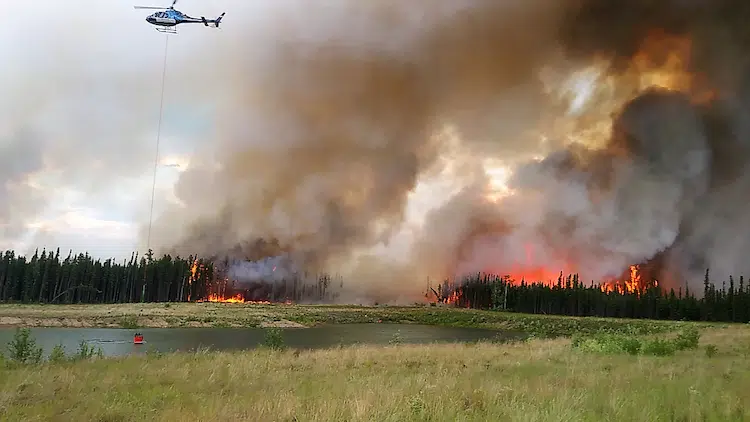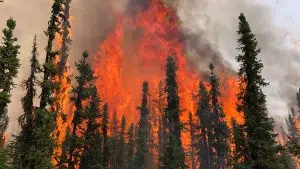
(Credit: Government of Alberta) “Fire risk is a national risk and there's risks across much of Ontario,” says Paul Kovacs, Executive Director for the Institute for Catastrophic Loss Reduction.
The country has unified behind Alberta as the province continues to handle and deal with the wide-spread wildfires that have spread through the area.
Different provinces including British Columbia, Quebec, Ontario and more, have shown their continued support for the province, with various firefighters from the provinces making their way over to aid in efforts to extinguish the blaze.
With the devastating fires creating a large stir across the country, there’s lots that Ontario residents and Londoners alike can take away as we get closer to the warm weather in the summer.
“Fire risk is a national risk and there’s risks across much of Ontario, just as there is in Alberta, British Columbia and the rest of the country,” says Paul Kovacs, the Executive Director for the Institute for Catastrophic Loss Reduction with Western University.
“The key is if you are near an area with forest or not and most of Northern Ontario is very much forested. A lot of cottage country is forested.”
While in south-western Ontario, Londoners are fairly well protected from the likes of widespread fires due to constant precipitation from the great lakes, it’s still important to know how to keep protected.
With cottage season on the way, many people from the London area will be making their way towards northern Ontario, where larger forests mean the area is a lot more susceptible to wildfires.
“Anywhere where you have forests, there’s the potential for wildfires and wildfire damage. You can take the right steps to be ready in Ontario, take the proper procedure. The same is being advised to people in Alberta and the rest of the country,” says Kovacs.
Ontario is no stranger to large scale fires. As recently as 2021, the province suffered from more than one thousand individual fires including two that are now the largest on record in Ontario’s history.
While forest fires are primarily known for being devastating on homes, families, and wildlife, it can be equally devastating for economies as a whole.
“In Canadian history, the most costly disaster ever to occur was the wildfire in Fort McMurray in 2016 and it did about $10 billion worth of damage,” says Kovacs.
“The cost to repair the buildings and put everything back in place after the fire had gone through was about $10 billion. You could do a lot of things with $10 billion if you don’t have to repair and rebuild, so wildfires have the potential to be very, very costly.”

(Credit: Government of Alberta) The country has unified behind Alberta as the province continues to handle the widespread fires.
All of that being said, Kovacs did mention that through the tragedy of a wildfire, they are natural phenomena that have happened across the country and the world for centuries.
“Fire is a natural part of our ecosystem,” says Kovacs.
“Fire renews the forest. It renews systems that have been a natural part of North America for tens of thousands of years. We regularly have fire, we regularly bring new growth, new energy into our forests and other lands. Fire is a natural part of the system that does that. We do not want fire to destroy our buildings and our property, but fire in the wildland is a natural system and it is not something to be feared.”
With the growing global temperatures, Kovacs says it’s easy to predict the commonality and severity of these fires in the this year and in the future.
“One of the key pieces of evidence that we’re finding with Western university and with international studies is that climate change is affecting many parts of our lives. The risk of fire for cottage country in Ontario, climate change is bringing more fire to the wildland and we’re going to have more area burned.”
Kovacs went on to recommend Londoners look into the Fire Smart program app. A national program that engages homeowners in wildfire mitigation activities through a self-conducted cottage and home assessment on-the-go with the mobile app. He went on to offer other tips to cottage-goers as well.
“Be ready that you may need to leave at short notice if there’s a fire coming and go quickly when you’re told. Use common sense and think about the risks, take the time to look around your own property to make sure you’re protected from any dangers.”





Comments